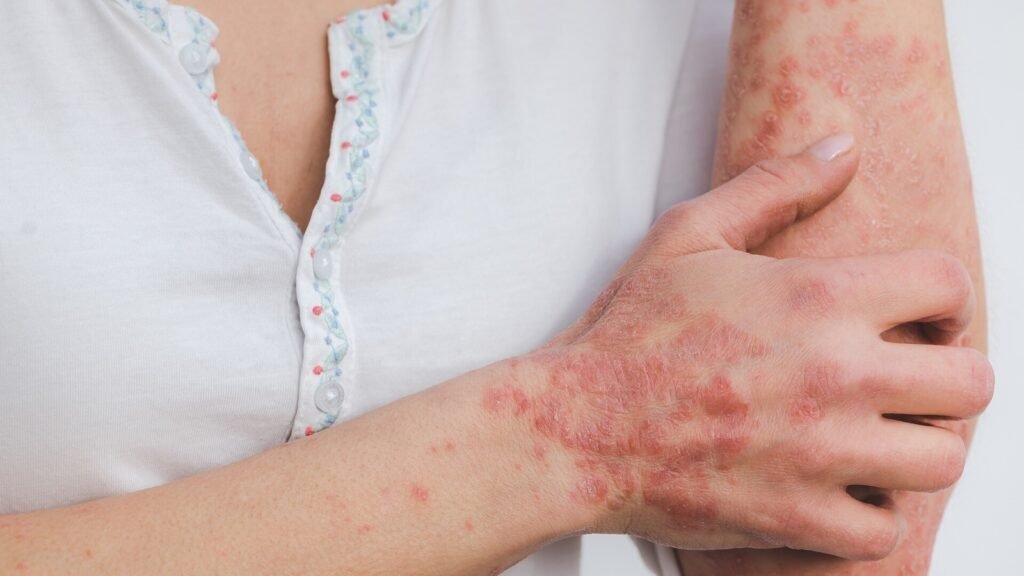Susceptibility of Psoriasis in the Rainy Season: Essential Management Tips
As the monsoon season arrives, people with skin conditions like psoriasis often experience a worsening of their symptoms. The increased humidity, reduced sunlight, and seasonal illnesses can create an environment conducive to flare-ups. Understanding these triggers is crucial for effective management.
Understanding Psoriasis
Psoriasis is a chronic autoimmune disorder characterized by red, itchy, and scaly patches of skin. The condition often becomes exacerbated during the rainy season due to several environmental factors.
Factors Worsening Psoriasis in the Monsoon:
-
High Humidity: The moist atmosphere can irritate the skin, leading to potential fungal or bacterial infections—common culprits for psoriasis flare-ups.
-
Reduced Sunlight: Natural sunlight plays a pivotal role in controlling skin cell turnover. During the rainy season, diminished UV exposure can worsen symptoms.
-
Temperature Fluctuations: Transitioning from cold outdoor conditions to warmer indoor spaces can strip moisture from the skin, leaving it dry and aggravated.
- Seasonal Ailments: Common cold and sore throat, often prevalent during monsoons, can trigger immune responses that may exacerbate psoriasis symptoms.
Managing Psoriasis in the Rainy Season
To alleviate symptoms and maintain skin health during the rainy season, consider the following strategies:
1. Maintain Daily Moisturization
- Product Choice: Opt for unscented, thick creams or ointments to keep your skin hydrated.
- Frequency: Apply moisturizer consistently throughout the day, especially after washing hands or bathing.
2. Modify Shower Habits
- Temperature Control: Avoid hot showers, as they can dry out the skin even further.
- Duration: Limit shower time to avoid prolonged exposure to water.
3. Choose Appropriate Clothing
- Fabric Selection: Embrace breathable fabrics like cotton to minimize skin friction and irritation during humid conditions.
4. Boost Your Immune System
- Nutritious Diet: Incorporate whole foods rich in omega-3 fatty acids, vitamins, and antioxidants to strengthen immunity and potentially improve skin health.
5. Adhere to Treatment Protocols
- Consistency: It’s crucial to stick to prescribed treatments, whether topical medications or phototherapy, to manage symptoms effectively.
- Avoid Discontinuation: Discontinuing treatment can lead to unexpected flare-ups and slower recovery.
"Psoriasis is a long-term illness and must be continuously managed. Stopping treatment will hinder improvement and may lead to uncomfortable flare-ups," advises dermatologists.
Additional Tips for Skin Care During the Monsoon
- Stay Hydrated: Drink plenty of water to help your skin retain moisture.
- Avoid Allergens: Be cautious of mold and allergens that thrive during the rainy season, as they might trigger psoriasis.
- Consult a Dermatologist: Regular check-ups can provide personalized care and regimen adjustments based on seasonal changes.
Conclusion
Managing psoriasis during the monsoon season requires awareness of environmental triggers and proactive skincare strategies. By adopting a holistic approach to skin health and treatment adherence, individuals can mitigate the impact of rainy weather on their symptoms and maintain skin comfort.
For further reading on psoriasis management, consider resources from Mayo Clinic or American Academy of Dermatology.
Staying informed and engaged with your skincare routine is essential to navigating the challenges posed by seasonal changes. Regularly update your knowledge by visiting trusted health platforms.


